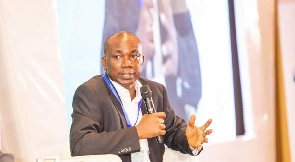 Professor Godfred A. Bokpin, a Professor of Finance at the University of Ghana
Professor Godfred A. Bokpin, a Professor of Finance at the University of Ghana
Professor Godfred A. Bokpin, a Professor of Finance at the University of Ghana, says the Government ought to adopt a “warlike” approach to solve the country’s economic challenges.
He said economic issues such as corruption, low tax revenues, public expenditure and all economic bottlencks must be dealt with intentionally.
Prof Bokpin said this at a roundatable dialogue on the impact of Economic Recovery Programmes on Social Protection in Ghana, organised by Caritas Ghana in Accra.
The roundtable dialigue was to shed light on best pracrices, identify gaps and challenges and propose recommendations and collaborative action steps for ensuring that Economic Recovery Programmes in Ghana aligned with Social Protective objectives.
It brought together Academia, Civil Society Groups, Faith Based Organisations and Policy Makers.
The Professor noted that developed countries like Malaysia and South Korea were succesful because they fought corruption aggressively, were intentional and consistent.
‘‘If we were efficient and prudent, less corrupt in utilising the tax revenues, the development outcome should be higher and better than what we have right now, and the reason we are in this sitaution cannot and should not simply be because we have nort taxed ourselves enough,’’ he stated.
Prof Bokpin said Ghana’s Value Added Tax (VAT) was effectively one of the highest in Africa, around 21.9 per cent, which was ‘‘too much’’, adding that designing a system like that would make it difficult for the citizenry to save and have proper investment to take advantage of the limited economic opportunities.
Reverand Sister Professor Eugenia Amporfu, an Economist and Professor in Economics, Kwame Nkruamah University of Science and Technology, called on Governement to be strategic in revenue collection.
She attributed the high unemployment rate to the inability of the country to grow its industry sector to absorb the teeming youth.
Prof Amporfu tasked Faith Based Organisations and civil society groups to lead the charge in providing quality leadership and governace, and to demand accountability from Government.
Father Clement Kwasi Adjei, Secretary General, National Catholic Secretariat, said it was essential to ensure that the benefits of economic recovery were shared equitably and reached the most vulnerable segments of the society.
Fr Adjei said social protection was critical in ensuring that the needy, particularly the poor and marginalised, accessed essential services, resources and opportunities.
He said there was the need for stakeholders to engage in robust discussions and knowledge sharing to generate actionable recommendations that would guide policymakers and pratctioners in designing and implementating holistic approaches to social protection that complemented recovery programmes.